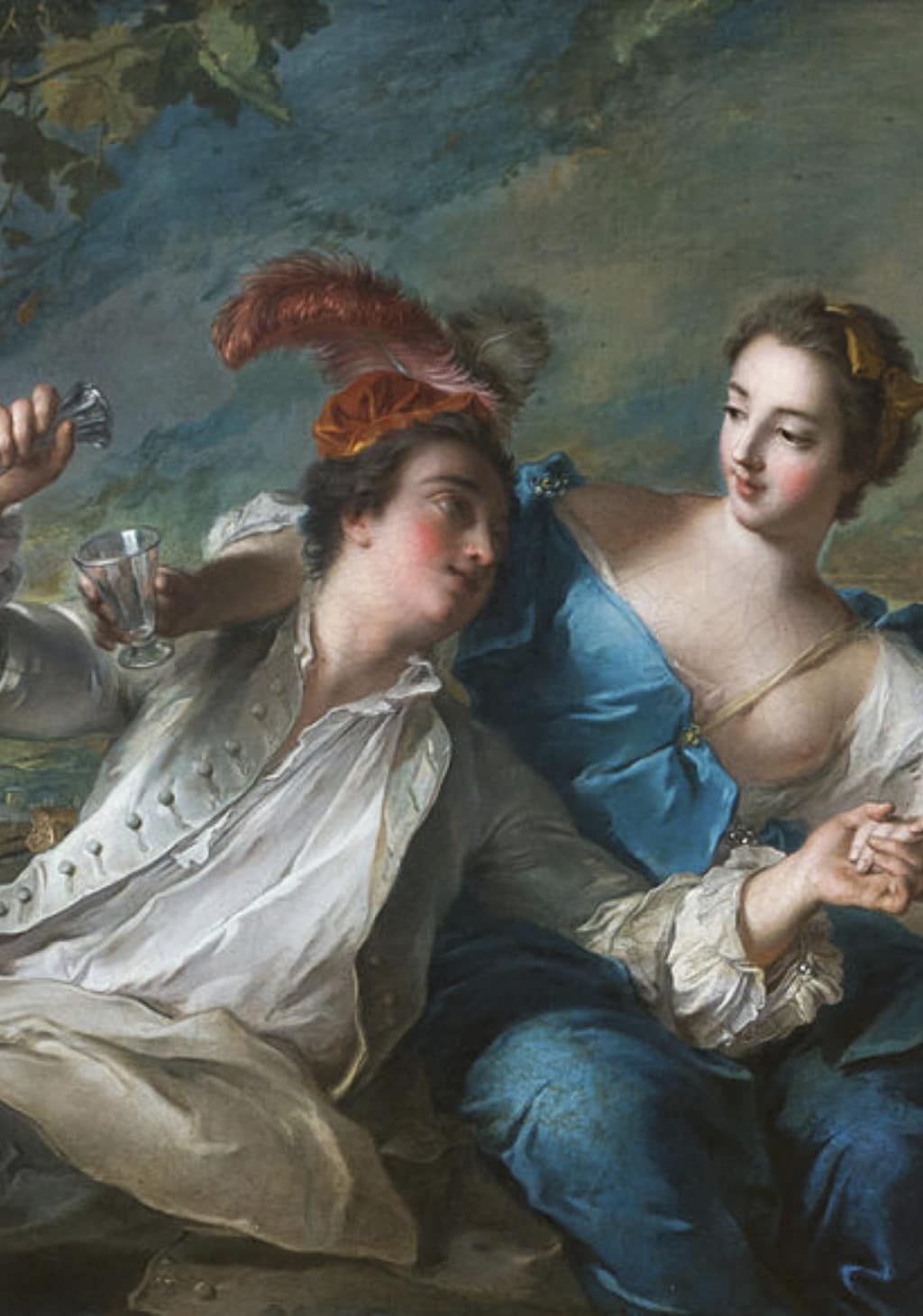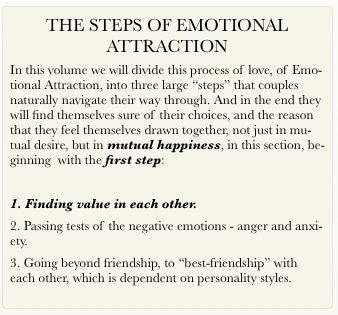
We have just left Step 3 of Courtship, the final step in the very first phase of human courtship, the "Act I" of our love story called, "Sexual Attraction."
You will recall that women hold all the power of deciding whether the romance will continue after that phase, because from an evolutionary and biological perspective, they have much to lose if they do not screen the man for traits of mature character. These same virtuous traits form the basis of a stable and lasting friendship, even when we are not talking about the area of romance.
We enter this new phase of courtship with the knowledge that we do have a sense of vitality and passion in being around the other person, but this is not the same thing as love or friendship. Rather, it is "desire" or "lust," which can be fleeting things that can evaporate from our lives as quickly as water from our hands.
For love to have a chance of lasting, we need something to "contain" that initial spark of passion, to bouy it when our attention for the prospective partner falters, or when we get distracted by the ordinary stresses of life that intrude on our blissful state of fantasy, and our "limerance" is fractured by the demands of today's world.
Rather than romantically subsisting on desire for a mate, alone, we must start to learn about how our social interactions can generate, not masculinity or femininity, but simple happiness in being together. Happiness is a synonym for friendship and for love, and when we feel it on account of another person's presence and actions in our lives, we come to place "value" on them, and become "valuable," ourselves.
This is the essence of the first step of this new phase of courtship, Emotional Attraction. That we learn what makes us valuable to others (the amount of happiness we give them), and what makes them valuable, and therefore, "lovable," to us, which is how happy they make us.

Friendship is defined in the Romantic Dynamics model as "consistent, mutual, shared positive emotion," which is similar to the model Aristotle established so long ago. If we have these four parts operating between us as a couple, it is very likely we can form a lasting friendship.
Friendship is synonymous with other terms that mean the same thing: positive emotion. Happiness is what is shared between friends, and that is positive emotion. Self-esteem is what is amplified by friends, mutually, and that is positive emotion, or happiness. Self-esteem is what we all get out of a friendship and what literally causes us to value our friends, and ourselves. And so learning to assess what we value, how "valuable" we are socially, and romantically, and how valuable others are to us, is the task of Step 4.
If any of the four elements of friendship (or love) are missing or derelict in the friendship, then it is possible to fail in the romance with this person. If two or more are missing, then it is very likely to fail.
To remain as friends, and capable of loving each other, we must maintain "consistency," the tendency to always have a stable nature that the other can count on, "mutuality," which is a fairness to the relationship, where neither potential partner is "leaning" too much, too often on the other, in an imbalanced, and therefore unfair way. The work and resources of the relationship, then need to not tilt hard, only to the benefit of one over the other (which would be narcissistic on the dominant friend's part.)
The friendship must be "shared," meaning that it can neither be "long-distance" and separated by geography, or other barriers to in-person, shared experiences, such as not having enough time, or the funds to be able to be near each other, or to do interesting activities that promote growth.
And finally, the friendship must have a "positive" energy to it, more optimistic than pessimistic; for, while many friendships form over a common enemy, or over some other negative thing, like the "toxic workplace" we both may work in, these friendships are doomed to splinter apart. The very nature of friendship and love is one where there is more positive emotions in being together, than alone.
THE EVENTS OF STEP FOUR OF COURTSHIP:
Certain things that MUST occur for this fourth step to go well, include:
- Having a practiced capacity to be happy when alone, and to be capable of sharing happiness.
- The recognition of unhappiness in one's self, and others, and the recognition of what actions that one can take to change both.
- A social habit of efforting to be a source of happiness to others when in a social environment, not argumentative for its own sake, nor a "free rider" on the happiness of others.
- The recognition that a depressive person, including if that is one's self, does not make a very valuable friend at the moment, and regardless of whether some may deem that fact to be politically incorrect.
- The recognition that an anxious person, including if that is one's self, does not make a very valuable friend at the moment, and regardless of whether some may deem that fact to be politically incorrect.
- The capacity to recognize what is inconsistent about people and about one's self, and effort to maintain more emotional and behavioral stability, to be a better friend.
- The capacity to recognize what is not mutual (or fair) in dealings with others, or toward one's self, and effort to cultivate more fairness and equal effort in a friendship.
- The capacity to recognize what the barriers to sharing experiences with others are, and to break those down when they are spotted. (Geography, time, funds, conflicting responsibilities.)
- The capacity to recognize what is negative emotion, or stressful, and to stop to make a change in emotional tone, or do the things that will change that tone, on a moment to moment basis. (This needs the psychological skill of Observing Ego to even recognize.)
- To see these four features of friendship in another person, and make efforts to pursue ongoing friendship with that valuable person.
One of the great things about friendship is that it is voluntary, but we find ourselves pursuing it, and specific people, because we notice how consistently, mutually, fairly, and conveniently they share their positivity with us. Friendship is easy, and better than being alone.
Which is why a second definition of friendship comes from the evolutionary psychology concept of "reciprocal altruism," or "you scratch my back, I scratch yours." It means that we "like those who like us," because that reciprocity benefits us all. You never know when you may need a "helping hand."
We also find that we benefit the most in friendship from similarities of interest, concern, beliefs and goals. In other words, if we were to see an overlay of "liking someone" (which pertains to the intellect) on top of "loving someone" (which pertains to the emotions), then:
"We like those who like us, and we like those who are like us."
Which is to say that friends, at baseline, benefit each other emotionally, but they may also find within what they share, to be the preconditions to actually teaming up for the purpose of working together on a goal. (This will be the aim of friendship in moving into the next, and final phase of courtship, the Intellectual Attraction that causes partners to be more successful at goals together than they were, alone and single.
Friendship doesn't require high intelligence, nor does it demand perfect similarity in our beliefs or goals, but those are helpful. One can have a true friendship with their pet dog, for example, where there is not even a complex, spoken language. Friendship can technically be shared between any two mammals, even of different species, because all that is required is the shared emotion of happiness, which naturally raises our sense of self-esteem.
Self-esteem is raised by love, and love, friendship, value and self-esteem are all synonyms. We love our dog, and we even love inanimate objects such as our automobile, simply because they increase our happiness.
For humans, the "highest mammals," friendship (and love) are on a spectrum of quality, from ordinary acquaintances, all the way up through "best friendship."
As humans, we find that the more we work on our character maturity, the higher the quality of friendships we find. Working on Observing Ego sees us spotting problems and changing them, then having no regrets in the future. Working on the personal boundary makes us more consistent and predictible, able to shield ourselves from stress, and the other person too. Our boundaries when paired with ethics, or conscience, makes us "fair," and both the boundary and our ability to be mature with emotions makes us less stressful to others, as well as more optimistic in our own lives.
TIPS FOR INCREASING YOUR VALUE:
Since the goal of the EMotional Attraction Phase is the ability to be happier and to raise the happiness of others, consider what was going on when a person perceives of themselves as either not being valuable, or not being valued by others (being taken for granted.)
Usually when we do this, we think of the other person or group as "not being nice" people or a person. The reality is that they are human, and they are a mammal. Mammals bond with those from whom they derive value," and so a different way to go about amplifying your value is to simply see an unfriendly person or environment as not receiving enough value from you, in order to give even more back to you. That means decoding how to make people happy.
Certain universal things cause people to be happy:
- Humor
- Telling people what they want to hear - that they are "awesome."
- Letting people talk about themselves. "Tell me more..."
- Mirroring happiness FOR THEM, such as smiling when they are not, which automatically causes them to smile, or laughing when they are not, which causes them to laugh, and therefore be happy.
If you make them happy, you have automatically increased your VALUE to them. It is harder to be "taken for granted" that way.
These are all ways of raising your value and recognizing value in others (they make each other happy.) But to be durable and lasting in a friendship or partnership, we have to have methods of dealing not just with how we feel and behave, internally, but also for dealing with the external environment that is sure to have stress - the opposite of self-esteem, friendship and love.
And so we will need to learn about that kind of scenario - stress - and how to handle it, in the very next step, Step 5, "Finding Stress in Each Other," to come next.

